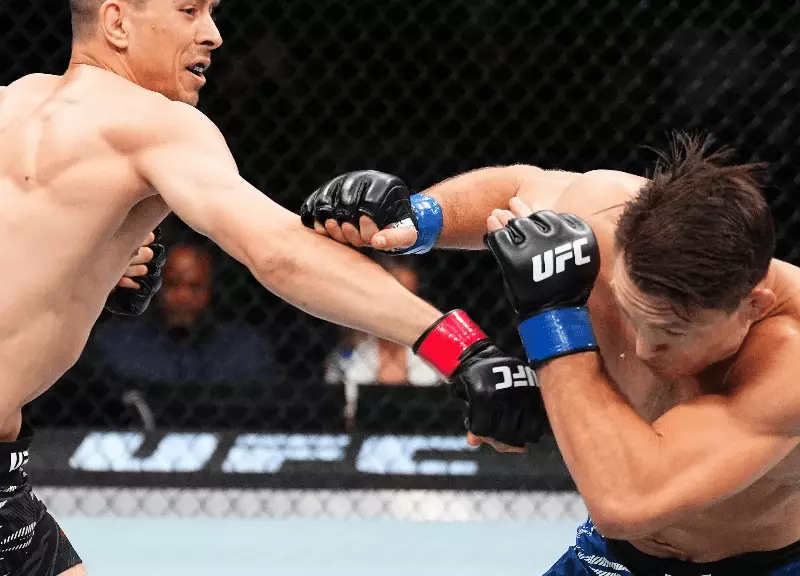Mixed martial arts (MMA) is an electrifying spectacle, where the stakes are as high as the fists thrown inside the octagon. The sport has evolved tremendously over the years, and with that evolution comes increasing scrutiny, especially regarding the role of referees. The recent co-main event at UFC on ESPN 64 showcased this delicate balance of authority when referee Mike Beltran faced criticism for his handling of the fight between Manuel Torres and Drew Dober. The incident, loaded with narrative and consequence, extracted significant commentary from seasoned voices in the sport, particularly John McCarthy, a veteran referee himself.
As professionals, referees are the custodians of fighter safety, tasked with the formidable responsibility of ending bouts when a fighter is no longer able to defend themselves intelligently. In Round 1, when Torres landed a devastating straight right followed by a barrage of hammerfists that floored Dober, it was evident that the situation called for immediate intervention. Yet, Beltran’s delayed response ignited heated discussion among fans and commentators alike. McCarthy claimed that the stoppage was perhaps a tad too late, igniting a crucial conversation around the fine line referees must tread in their decision-making processes.
The Cost of Delay: Assessing the Damage
The crux of this debate often resides in the duration between a fighter being incapacitated and the referee’s action to halt the fight. Seconds can feel exponentially longer in that heated atmosphere inside the octagon. McCarthy’s observation regarding the number of unanswered shots Dober endured led to a critical reflection on the potential long-term effects of such damage. It isn’t merely an isolated setback; rather, each critical second in which a fighter is subjected to severe strikes can accumulate into substantial harm over time. The potency of hammerfists, while dismissed by some as less impactful than traditional punches, should not be underestimated.
A fighter’s vulnerability and the potential for lasting damage make it imperative for referees to operate on instinct—a trait that McCarthy emphasized should have been favored in favor of Dober’s protection. The emotional weight on a referee’s shoulders cannot be overstated. With every decision to stop or continue a fight, the well-being of an athlete hangs in the balance, echoing through their career and potentially their life outside of the sport.
Dober’s Resilience: The Spirit After a Setback
After the bout, Dober’s reaction was more revealing than mere disappointment; it encapsulated the resilience that defines a fighter. Despite facing the defeat that marked his third consecutive loss, Dober maintained a perspective that exemplifies the spirit of competition. His ability to express gratitude for the experience and highlight aspects of his life outside of fighting demonstrates a level of emotional intelligence that is often overlooked in the raw emotion of post-fight assessments.
“What was truly impressive was his ability to connect his experience in the octagon to the broader context of life,” Dober remarked about his battle amidst the harsh realities of professional fighting. For athletes, especially in a demanding sport like MMA, the journey often involves peaks and valleys, where self-reflection becomes as crucial as physical preparation. The public’s reaction—both support and criticism—reveals the often-blurry lines of sporting narratives where results can overshadow the heart and passion that fuel the fight.
Trusting One’s Instincts: The Referee’s Dilemma
In scrutinizing the actions of Mike Beltran, it becomes clear that trusting one’s gut is a vital component of refereeing in MMA. McCarthy suggested that Beltran may have second-guessed his initial assessment, leading to a perceived indecisiveness that could cost an athlete their safety. There’s an innate pressure to ensure that fighters are given every chance to continue competing while simultaneously protecting them from irreversible harm. It’s a dilemma that becomes increasingly complex with each additional strike.
This lingering uncertainty highlights the need for ongoing training and reassessment for referees in the sport. Immediate feedback loops after events could facilitate learning and improvement, shaping the referees of tomorrow. Just as fighters evolve their skills in the gym, officiating must also adapt, enabling referees to strike a balance between aggression and safety as the sport continues to grow in popularity and contact intensity.
The world of MMA remains riddled with nuances that extend beyond mere scores and records. The dynamics between athlete and referee, the weight of responsibility, and the unyielding quest for safety highlight an inherent complexity that underpins this fierce sport. As discussions continue to flourish around incidents like the Torres-Dober bout, they illuminate the critical conversations necessary for the overall progression and integrity of MMA, ensuring that captivating performances don’t come at the expense of the fighters’ well-being.

